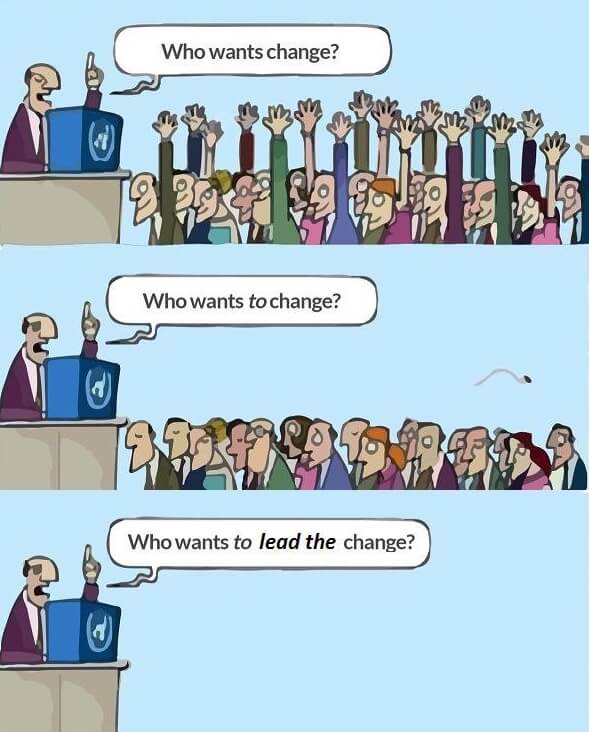
Insights into successful patient advocacy
Written by Huib, published Friday July 13th, 2018
In the first article about system dynamics – ‘The Law of Maintaining Misery‘ – you could discover how the gaps in understanding between layers in the social system called ‘health care’ are too wide, when it concerns diseases with a disputed status and the misconception of them having a psychological origin. Simply said: “when the tests don’t find anything, you must be crazy and faking everything”. This second article is written for those patients who are no longer willing to be ‘patient’ and wait for ‘others’ to solve things for them. What can you do to help further the situation? And what not? This second article also clarifies why I am leaving all patient groups on Facebook, after spending four years in them to guide ill people through the labyrinth of unclarity and misinformation.
“Truth always rests with the minority, and the minority is always stronger than the majority, because the minority is generally formed by those who really have an opinion, while the strength of a majority is illusory, formed by the gangs who have no opinion — and who, therefore, in the next instant (when it is evident that the minority is the stronger) assume its opinion… while truth again reverts to a new minority.” – Søren Kierkegaard
Lessons from Powerlab for health care
The main insight from the workshop Powerlab, which was described in the prior article ‘The Law of Maintaining Misery‘, was to recognise the standard dynamics of one’s subgroup and be brave enough to make one’s own choices – regardless of the punishment for going beyond the predefined boxes of what is considered to be normal or good within that group. The second was to start listening to the experience of people in the other groups, coming from a genuine interest in their worlds. Then freedom to create a ‘different ‘game’ together started to arise, as participants increasingly found out they all helped to maintain a status quo that nobody actually wanted.
We called this the ‘Law of Maintaining Misery’ at the business university. In the ‘serious game’ called health care this outcome is very real for the Bottoms: they live in a world of suffering, increasing isolation, bankruptcy – too often ending in death. However, if they expect ‘others’ to come and save them, while resenting them for not doing it quickly enough or in a way it feels uncomfortable for them – which is somehow always the case with new pathways towards transformation – it will not work.
This understandable response will actually actively block any real change from happening. The real power of the Bottom group is in their numbers, if that power is well focused. The way out of the ‘lobster basket’ is to organise themselves effectively and to support those with tactics or strategies to either challenge those with interests to maintain the status quo or to open the narrative into other local, national or international arena’s. Before the end of the month an interview about this very topic with Fred Verdult, the new chairman of the Dutch Lyme Patient Association (NVLP) will be published on the On Lyme website.
Middles should stop running around vertically through the system and create the time to coordinate into useful collective action. The global group of medical or social scientists, doctors, lawyers and human rights experts, who have united in the global Ad Hoc Committee to address the current situation with Lyme and ME as a human rights issue with the appropriate channels (UN), is a constructive example. Many of its voluntary international members have already started to cooperate on specific projects, which would be impossible within their individual countries. I have seen personal transformation happen amongst my colleagues, simply because they no longer feel isolated and powerless to change anything individually or to take on their national Medical Boards without solid support of credible other professionals. Together they can create the communicative settings in which a real conversation can take place between Tops and Bottoms, instead of trying to run around to fight (too many) individual fires, while risking their licenses and livelihoods doing so.
Instead of building ever higher Ivory Towers in order to retract from the chaos, trying to stuff reality into spreadsheets and create more meaningless rhetorics, Tops should come down, listen and engage. Again, the human rights angle creates a new language to have this conversation for them. As long as ‘Lyme’ is regarded as a purely medical-scientific issue in the public opinion, they will step aside and let the ‘experts’ decide what is what. It will be the experts’ “No, Lyme does not exist after two weeks” against their clients “Yes, it does and we’re dying!” Patients should know by now who will ‘win’ that debate, as it has gone on for over forty years. From a communications point of view, a discussion or a debate (yes versus no) is the least productive way to move forward in a complex situation. Human rights violation is not something that can be denied, as it is now on record with the UN, and it shows how both Bottoms and Middles are misguided. To the Clients this can be so interested that new doors to the media will also open up, without the need to appoint blame. A systemic issue is never solved by only blaming or punishing the ‘bad guys’, but by engaging every actor in the system. Therefore, this angle unites instead of polarises.
Beware of self-fulfilling prophecies
The Lyme and ME communities consists of countless millions of people, who are often so disabled and certainly geographically apart, that Facebook seems to be their collective living room. To my surprise many of them were not even be able read a whole book anymore because of issues with their brains, while laying in darkened rooms with their phone screen as the only relay to the outside world. And if they still can read, many have so little money left that they could not affort to buy a book. This is why I made my book ‘priceless’. My intention was to get it read, not to become a ‘best-selling author’.
As I said in the introduction to the first part of this article, I’m sure that this way to feel connected to others in a similar, perplexing and life-threatening situation has saved lives. The downside of (a)social media is that the conversation can be scattered and easily become rather aggressive. This undertone of aggression or indignation is what will shy others away. Recently, for the first time in my career in Lyme Land, I had to report two people – a Dutch Lyme patient and a caretaker – to the Police. If I had been less intrinsically motivated to work for the whole group, I simply might have given up. Now I will just reposition myself on this global ‘game board’, further away from the Bottom group. That is why I like the human rights angle, as it applies to all 7 billion of us. Including myself.
In any Bottom group there always will be those who feed on negativity, gossip, fights and other destructive interactions. These are mostly the same patients who are also sending threats to the few doctors still willing to treat illnesses like Lyme or ME. On the other hand, there are also always those who can think for themselves, who are brave enough to climb out of the ‘lobster basket’ and who even extend their hands to those who also want to climb upwards. These are the two extremes of conduct in any Bottom group.
The silent majority however decides who directs the course of the whole group: if climbing upwards is rewarded or punished. If they remain silent, the screamers will always win, as they have done during the whole of human history and the few mavericks will leave the sinking ship. Then the whole group will be regarded – and thus discarded – as the stereotype that was carefully constructed for them: as ‘Lyme Loonies’ or ‘militant ME patients‘. So take a step back now and then to reflect on the group’s image you’re creating together, seen from he perspective of others. Being regarded as a ‘victim’ will not help you much. Neither will not taking action to influence the dynamics that will decide your fate.
If you really want to be taken more seriously by others, don’t take yourself too seriously. It leaves no space for others to relate to you. And I would like you to consider to maybe stop using the word ‘patient’ to define yourself socially, because I increasingly see an dehumanising effect of that word in the public narrative. As I am not doing my work because I’m ill myself anymore, and thus not ‘one of them’, I try to use ‘people with Lyme or ME’ as much as I can instead of using the word ‘patients’. People are much more than ‘patients’ to me, unless they define and limit themselves like that and will automatically adopt a ‘Bottom attitude’ with the resulting stereotyping from the other groups.
Serious game theory
In business education, this type of learning context is called a ‘serious game’. In a classroom this is very different from real life, as it helps to allow participants to relax and take some distance between playing and reflecting. In the much more serious ‘games’ played with debilitating diseases it is harder to learn, yet much more urgent.
Despite what many ill people believe, the way forward may not be more scientific discoveries, medical solutions or better guidelines, yet (also) a different type of public conversation. I will use the board games of Go and chess as a metaphor for these different types of conversations. Chess is well-known in the West and can be called a tactical game (fixed positions with restricted moves, facing each other’s army with the aim to kill the leader), while the Asian game of Go is rather strategic (static stones enclosing empty space and creating a setting in which positions are made irrelevant). Go is over 4,000 years old and incorporates ancient wisdom. Chess is and does not.
Years ago I met an English chess grandmaster on a Greek Island, where I was sitting playing a game of Go ‘against’ myself on a sunny terrace. He was fascinated and wanted to learn how to play it. We played during the rest of that week, some eight hours a day. He did not mind losing (which is not a general character trait for those who are called ‘master’ in their domain) and exclaimed at one point: “Wow, this is like playing on four interconnected chess boards! All my abilities to win at chess don’t suffice to even understand Go“. I told him about the remark of another chess grandmaster, Edward Lasker: “While the Baroque rules of Chess could only have been created by humans, the rules of Go are so elegant, organic, and rigorously logical that if intelligent life forms exist elsewhere in the universe they almost certainly play Go”. We had a great week together and both learned a lot.
A new position
To be able to do my type of ‘pathfinding’ work in the current health care system and to sense where I need to go or when to focus or defocus, I use all the games I liked to play during my life. These are soccer (how to play in a team and my most effective position in that game, as a last defender), aikido (how to connect, position, move fluently and deal with conflict or a group’s energy), Go (playing around power positions and using new connections to encircle more open spaces) percussion (sensing the rhythm of the music we play together and ‘hear’ where notes make the music more beautiful or not, while inspiring my fellow musicians to play better together) and the Art of War (using compassion and wisdom instead of cold intelligence in the hidden war zone of Lyme and ME, against more powerful opponents). They don’t only help me to make most effective use of my own talents, solo or in the Ad Hoc team, yet they also help me to actually enjoy playing my current serious game, in which people are literally dying each day. If I enjoy playing it for many, I can continue as long as I live or as long as it’s needed.
To be able to continue my work and to talk with other groups on behalf of the Bottom group, I need to reposition myself now. This means that after posting this article, I will move out of all Lyme groups on Facebook. For you as ‘Bottoms’ that means that you will now need to undertake action yourself, if you want to keep reading my posts and articles. This is not common for Bottom dynamics, as a remark of one of my business clients typified. One employee of a rather prestigious company exclaimed during a session on the company’s culture: “What do you mean that we have a communication problem? Why did nobody tell me!?” A brilliant remark.
If you want change, you can cooperate towards it, within your limits and abilities. Which can simply be that you actively go, find and share information, or have your computer or a friend read it to you, if you are no longer able to do so. It seems that the fate of any Bottom group – regardless if it consists of patients, employees, children caught in sex trafficking or civilians living in a war zone – will only structurally change when enough of its individual members are brave enough to aim for more than their individual short-term interests such as personal survival, security, attention or justice. Your experience may seem very personal, yet it certainly is not.
I’ve heard thousands of similar stories from many countries by now and my conclusion is that the grass is not greener elsewhere, for people with Lyme and ME. Or Morgellons or PANDAS, to name a few other ’emergent’ diseases, which are routinely simply denied to exist as ‘real’. Interesting psychological professional denial mechanism to deal with new challenges, isn’t it?
Here you can find links to articles, movies and books I’ve collected for you. Both my personal website and the On Lyme Foundation websites have Newsletters to which you can sign up. I will remind myself to actually start using them.
These are the three Facebook pages, where I will keep posting articles and interviews: Impatient Revolution, On Lyme Foundation and my English book Shifting the Lyme Paradigm. If you like these pages and click on some function, it will show its post in your Timeline first.
Here is the link to it is my e-book. It does have a price tag on it now, after a group of Lyme patients attacked me, accusing me of being ‘commercial’. It seems that by not putting a price on my work, this leads to devaluation of its value as well as to mistrust of intentions. People never seem to amaze me. If you really don’t have the money for it, you can mail me to ask for it and get it for free anyway.
Helping the helper?
Sometimes I still wonder how I could have a highly paid function in a system (business education) that I didn’t feel produced much real value to society, while the work I’m doing now is much more valuable to many more people, yet cannot be paid from existing financial sources without mucking up the integrity of that work.
As I said before: I’m intrinsically motivated. I don’t need much outside of myself to continue – apart from pets to keep me sane. However, after financing my work for 8 years myself, I do need around 20% of my former income to keep my full attention on the fuzzy global game field I’m playing on. Your help is welcome, as most of the people I work for simply don’t have the money to finance my journalistic and human rights work themselves. So if you value my work, there are two actions you can take to actively help me to continue in a sustainable way.
If you can spare a monthly amount, no matter how small, could you consider chipping in on my Patreon campaign? And if you can’t spare the money, you can bring the campaign to the attention of those who are (still) healthy, do earn money and may feel inclined to do so, if you are able to talk ‘within their language’. During my own career I’ve learned that ‘seducing’ people into possibilities is much more effective than convincing others to accept ‘truths’ or manipulate them into ‘having to help’.
Cheers,
Huib Kraaijeveld, MA
Author of ‘Shifting the Lyme Paradigm‘, chairman of the On Lyme Foundation and founding ex-member of the Ad Hoc Committee for Health Equity in ICD11 Borelliose Codes

In: Blog Philosophy Inspiration Lyme Media Human rights Social
"This book perfectly describes the plight of millions of patients, who suffer from chronic Lyme Disease in many countries all over the world."
Prof. Christian Perronne, France
"This book is a gift of truth and passion to humanity."
Mia Morales, Lyme patient, USA
"I received the book exactly on the day that I had decided to end my life. Huh?! Yep. I am 35 years old years and have been ill for 19 years. Now I know why: Lyme. Everyone should read this book!"
Miranda, the Netherlands
"This book offers a new practical, human centered way of dealing with health information. It is also ringing a bell for the new time how to work together towards health and thriving."
Kim Schimmler, MD, Germany
"This pioneer's work made it perfectly clear that, when "i" becomes "we", even illness becomes wellness."
Frans Vermeulen, journalist, the Netherlands
"In his crucial work on Lyme disease, dedicated social researcher Huib Kraaijeveld does not pretend to have all the answers, but guides us towards asking the upsetting and essential questions."
Prof. Cees Hamelink, professor Communication Sciences & Human Rights, the Netherlands
"This book reads like a thriller! It touched me deeply and I am sure it will change the course of history."
Linda Graanoogst, journalist, the Netherlands
"Well, I am wiping my eyes and blowing my nose, while tears stream down my face. I guess that is a good sign. You hit the nail on the head claiming that Lyme survivors need 'understanding'. I would like my own partner to read this book."
Anodea Judith, PhD & author, USA
"What an awakening perspective! Huib has successfully set a quantum leap for understanding and managing Lyme disease by common people."
John Wong, bestselling author, Singapore
"A true and unpretentious caretakers' guide to understand Lyme. This book will help you to completely understand what your friend is going through; regardless of the symptoms they have. I wish it had been written ten years ago, because it can actually save lives!"
Cheryl Versalle, Lyme patient, USA
"This book actually speaks to people beyond its target audience (caretakers of people with Lyme Disease): people like me who are not travel companions, but to whom it is not hard at all to have or develop understanding and compassion. This makes the reach of this book bigger, much bigger if you’d ask me. I am amazed a book can do all of this!"
Saskia Steur, business blogger, the Netherlands
"This book reads like an exciting novel, were it not that it concerns a deadly serious issue. It calls to contribute and take care of each other and our world. Read, weep, feel and act!"
Manfred van Doorn, leadership expert, the Netherlands
"A creative and very intelligent vision to dive even deeper into the world of Lyme, to look at yourself, other people, but also the entire world around you."
Friend of someone with Lyme
"The book indicates that Lyme disease can be a sexually transmitted disease. This will cause a tidal wave of awareness all over the world. Like the child in the old fairy tale The Emperor’s New Clothes, who exclaimed: 'But the emperor is wearing no clothes!'"
Ola Aniel Petterson, STD campaign leader, Sweden
"What a brilliant sociological work! I am sure it will have much impact."
Professor Neuropathy, Germany
"This book is a big eye opener. Both for friends of people with Lyme disease as well as for people with Lyme. Or for any other health issues, for that matter."
Martin Möhrke, medical research leader, Europe
"I cannot read any other book for more than two minutes now, in this hell called Lyme. Yet yours I cannot stop reading! I should have put it away hours ago to clean the house. But I simply cannot stop."
Ineke, wife of a husband with Lyme, the Netherlands
"This book is a delight to read. It offers soft candlelight and warm campfire camaraderie on an often dark and lonely journey."
Laura Bruno, medical intuitive Lyme expert, USA
"A very honest and yet witty way of helping those with Lyme disease. This book is full of ideas on how to help your friend with Lyme, as a travel companion on this crazy journey called 'Lyme'."
Lisa Hilton, Lyme advocate, USA
"Both the personal experiences as well as the author’s sharp mind turn this into an incredibly inspiring book that raises the consciousness of its readers."
Kara, ex Crohn disease patient, the Netherlands
"Tempting, informative and eminently readable! Shifting the Lyme Paradigm is an absolute eye-opener for those who are not aware of what the journey of Lyme disease entails."
Terri Mackinnon-Cross, CEO WorldLymeDay.com, Canada
"This book gave us the recognition and acknowledgment, which were like a band-aid on an open wound."
Sara, Lyme patient, Belgium
"Very insistently written based on intensive, almost existential, personal experiences, this book also gives a clear overview of all relevant information for both patients and caretakers."
Jan Eendebak, former chairman Lyme Foundation STZ, the Netherlands
"A relief to read, written by an expert who shares his dedication to his own path with us, and brilliantly written."
Muna, mother of a daughter with chronic Lyme, the Netherlands
"Playful, frightening, informative and encouraging."
Merel, kinesiologist, the Netherlands
"This book made me realize that there is too little known behind the phenomenon Lyme. In a challenging manner the author provides understanding of Lyme disease and suggestions for tackling this disease. I have 'prescribed' this book to many of my patients and mostly astonishment was soon followed by recognition. An absolute must for anyone with (still) unexplained symptoms or the people close around them."
Duco Kanij, osteopath, the Netherlands
"This book guides you through the labyrinth of Lyme swiftly, while it took us YEARS to even get this far."
Eugenie van der Linden, ex-Lyme patient and therapist, the Netherlands
"This book is an absolute 'must read' for everyone! For patients, for family and friends, and for doctors who can finally learn that Lyme is more than what is written in their textbooks and that they should not be able to dismiss "unexplained" complaints as psychological too quickly!"
Anne Fierlafijn, MD, Belgium
"Shifting the Paradigm of Lyme is not like any other book on Lyme that I have read. It appeals to a higher consciousness, and is analytical in an introspective way that is pleasant to read. This book is a friendly and warm reminder that no Lyme patient is ever alone."
Thomas Grier, biologist, USA
"This book show how caring friends can intervene to provide succor and alliance ‘against the odds’ of a potentially serious and very complex illness that is still poorly understood by mankind."
Kenneth Liegner, MD, USA



